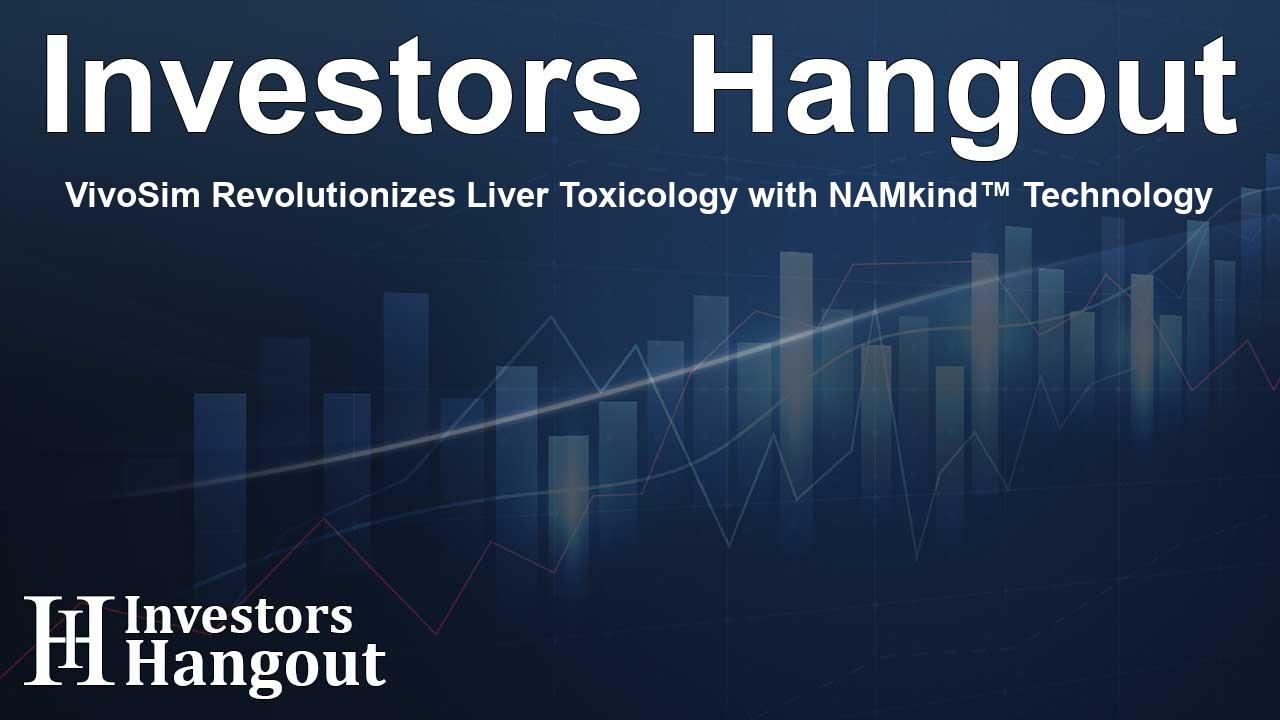VivoSim Revolutionizes Liver Toxicology with NAMkind™ Technology

VivoSim's Groundbreaking Liver Toxicology Prediction at Recent Conference
VivoSim Labs, Inc. (NASDAQ: VIVS) recently made headlines at a significant medical conference, showcasing its innovative NAMkind™ platform for liver toxicology prediction. This platform is designed as a commercial service tailored for pharmaceutical companies, offering superior predictive capabilities that have garnered attention from industry experts.
Exceptional Predictive Power in Liver Toxicology
The results presented during the conference highlighted the platform's impressive predictive power, achieving a remarkable sensitivity of 87.5%. This means that when confronting a set of challenging liver toxicity cases, the platform accurately identified 87.5% of known liver-toxic drugs. Additionally, the specificity reached 100%, indicating that none of the non-liver-toxic compounds were mistakenly flagged as having toxicity issues. This level of accuracy positions VivoSim at the forefront of liver toxicology research and application.
The Role of Human-Derived Organoids
What sets VivoSim's NAMkind™ liver model apart is its foundation in physical organoid technology. Utilizing cells from human donors allows for a more precise reflection of how drugs may interact with human liver tissues. This approach represents a shift towards more ethical and effective drug testing methodologies, reducing reliance on traditional animal models.
Advancements in AI-Powered Predictions
VivoSim is not only advancing physical testing methods but is also integrating artificial intelligence into its predictive strategies. The AI models developed within the NAMkind™ services suite are trained on a comprehensive array of proprietary data derived from human organoid models. This innovative combination aims to enhance the quality and relevance of data, providing pharmaceutical developers with deeper insights that surpass what can be achieved through standard clinical trials.
Impact on Pharmaceutical Development
By offering potent insight into liver and intestinal toxicology, VivoSim aligns with recent FDA initiatives to phase out animal testing in favor of non-animal methodologies. The FDA's commitment to transitioning away from animal models, reiterated recently, is anticipated to significantly boost VivoSim's market adoption. This shift not only addresses ethical concerns but also aims to disrupt the extensive multi-billion-dollar animal testing market.
The comprehensive platform developed by VivoSim is poised to revolutionize drug development. The company believes it can significantly lower the instances of drug failures attributed to unpredicted liver toxicity within clinical trials, cutting development costs potentially by as much as 50% across the pharmaceutical industry. Currently, many drugs face withdrawal from the market or fail to reach patients due to undiscovered liver toxicity, and VivoSim's innovative solutions seek to mitigate these risks effectively.
Transformative Solutions for Patient Care
VivoSim’s advancements are not limited to liver models; its NAMkind™ intestine models offer insights into drug interactions with intestinal health, addressing issues often overlooked in drug selection processes. For cancer patients, this means potentially relieving side effects such as nausea or adjustment of chemotherapy doses, ultimately improving patient outcomes and experiences during treatment.
As the FDA sets forth its goals to reduce and potentially eliminate animal testing requirements, VivoSim is stepping up to meet this urgent demand for ethical, efficient, and scientifically advanced solutions. With the backing of innovative technologies and insights from FDA officials, VivoSim is committed to a future where drug development is safer and more accessible to patients globally.
Contact VivoSim for More Information
For further inquiries, individuals can reach out to VivoSim’s investor relations team via email at info@vivosim.ai. They are prepared to provide additional insights and information regarding their pioneering work in liver toxicology.
Frequently Asked Questions
What is the NAMkind™ platform?
The NAMkind™ platform is VivoSim’s innovative liver toxicology prediction system designed to enhance the safety and efficacy of drug development.
Why is predictive power important in liver toxicity?
High predictive power helps pharmaceutical companies avoid late-stage clinical trial failures due to unforeseen liver toxicity issues, saving time and resources.
How does VivoSim’s model differ from traditional methods?
VivoSim uses human-derived organoid models and AI technology, providing more accurate predictions and reducing ethical concerns compared to animal testing.
What are the potential benefits for patients?
With improved predictive models, patients may experience safer treatments and reduced adverse side effects, improving their overall care.
How is VivoSim contributing to FDA initiatives?
VivoSim supports the FDA's goals to phase out animal testing by providing advanced non-animal testing methodologies that are more predictive and ethically sound.
About The Author
Contact Owen Jenkins privately here. Or send an email with ATTN: Owen Jenkins as the subject to contact@investorshangout.com.
About Investors Hangout
Investors Hangout is a leading online stock forum for financial discussion and learning, offering a wide range of free tools and resources. It draws in traders of all levels, who exchange market knowledge, investigate trading tactics, and keep an eye on industry developments in real time. Featuring financial articles, stock message boards, quotes, charts, company profiles, and live news updates. Through cooperative learning and a wealth of informational resources, it helps users from novices creating their first portfolios to experts honing their techniques. Join Investors Hangout today: https://investorshangout.com/
The content of this article is based on factual, publicly available information and does not represent legal, financial, or investment advice. Investors Hangout does not offer financial advice, and the author is not a licensed financial advisor. Consult a qualified advisor before making any financial or investment decisions based on this article. This article should not be considered advice to purchase, sell, or hold any securities or other investments. If any of the material provided here is inaccurate, please contact us for corrections.
